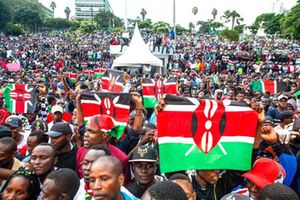
Anti-femicide march in Eldoret town, Uasin Gishu, on January 27, 2024, following a recent spike in femicide in Kenya.
In this, the third and penultimate column in my series on ‘Confronting Kenya’s Demons’, I reflect on misogyny and the crisis of femicide in Kenya.
My progeny includes two daughters, and so I write here with a lot of pain for all the parents, relatives, and loved ones who have been visited by the vilest of gender-based violence and its hatreds in our society.
To be sure, misogyny – the hatred for the female gender – isn’t unique to Kenya, or Africa, as the West portrays the issue. This, however, isn’t to say that Africans don’t suffer from the problem in a most severe manner, or that African cultures aren’t deeply afflicted by it. We just need to look inwards to see how this cancer is killing Africa.
Patriarchy — the systematic domination of men across all social, economic, and political institutions — is the order of the day in all societies.
Arguably, some countries in Europe have done much better in alleviating patriarchal dominance in society than most.
Still, even in Europe, women are far behind men in many facets of life. Interestingly, in the United States, the most dominant state in the world today, and one that’s touted as among the most socially advanced, women still lag far behind men.
While a smattering of states in Europe and Asia have elected female heads of state, the United States has, in the last decade, rejected two very highly qualified women for the highest office in the land.
Donald J Trump, who was elected for the second time last November to become President of the United States later this month, defeated both female candidates for President.
In 2016, Mr Trump shockingly beat Hillary Clinton, in the view of many, the most qualified person of either gender to have run for President of the US.
Last November, Mr Trump beat Kamala Harris, the US Vice President, another highly qualified woman. Mr Trump is, without doubt, the most misogynistic major party candidate to ever run for US President.
Yet large numbers of men and women voted for him not in spite of his misogyny, but because of it. That speaks volumes about how deep-seated the hatred for women is in the United States.
If misogyny is a crisis in the United States, it is a burning inferno in Kenya. Misogyny manifests itself in several ways. These are attitudinal, cultural, religious, and practical.
The attitudinal manifestations are both casual and deep-seated. These often are baked into institutional stereotypes in the family, educational institutions, and the workplace.
The family is perhaps one of the most egregious sites for discrimination against women. It’s here where violence is institutionalised and normalised.
The father, whether deadbeat or not, is presumed, by virtue of genitalia, to be the head of the family. By dint of male anatomy, the father/husband is a rogue actor in virtually all families. He is king, judge, jury, and executioner. His word is law and the gospel truth.
All the females in the family — from wife to daughter to the domestic worker, who’s also usually female — exist at the mercy of the husband/father/head of household. He does no house chores. He makes no beds. He cleans no house. He cooks not.
It doesn’t matter whether his wife makes more money than him. Everyone is at his beck and call. Male children in the household are socialised to be brutes either by command or by force. In many ways, the family is both the training and proving ground for female subordination and gender-based violence.
This is the sad reality, and there’s no need to sugarcoat it. The home in Kenya is a site of gender-based cruelty. The father/husband beats, molests, and, in many cases, rapes the wife, the daughter, and the domestic worker.
The statistics are grim. Spousal and intimate partner violence are the causes of most cases of femicide. Even where death doesn’t occur, the women are beaten to within a whisker of their lives. Usually, law enforcement doesn’t act to hold the culprits accountable until it’s often too late.
What has alarmed observers even more in the last several years is the rise in the number of cases of femicide involving casual or chance encounters in situations of merry-making and more contemporary hook-ups for romantic escapades.
We have seen grisly cases where young women have been butchered in the most savage of ways during such encounters. Bodies mutilated beyond recognition. Eyes gouged out. Genitalia cut up. It shocks the human conscience.
What’s to be done? The first and most important thing we can do as a society is institute a different moral code on gender. This means social engineering a different way to be male and masculine.
You aren’t a man if you feel your oats by misogyny or gender-based violence. Instead, you are a coward. We need boys and men to unlearn misogyny. Our homes, schools, and institutions of society must become teaching and proving sites for a new man.
Makau Mutua is SUNY Distinguished Professor and Margaret W Wong Professor at Buffalo Law School, The State University of New York. On X: @makaumutua.







